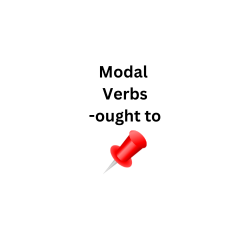Modal Verbs: ought to

Modal Verbs: ought to
Ought to is a modal auxiliary verb that is used to express obligation or duty.
It is often used to suggest a moral or ethical obligation, rather than a legal obligation.
Here are some examples of how to use ought to:
Obligation in the present:
You ought to eat your vegetables if you want to stay healthy.
We ought to be more environmentally conscious and reduce our carbon footprint.
Obligation in the past:
I ought to have studied harder for my exam.
You ought to have called me before coming over.
Advisability:
He ought to take a break and get some rest.
She ought to consider taking a different approach to the problem.
Probability or likelihood:
It ought to stop raining soon.
They ought to arrive at the airport on time.
Note that ought to is followed by the base form of the verb and can be used in negative sentences and questions.
It is not commonly used in the continuous (progressive) tense or the perfect aspect.
Usage of ought to with the Indefinite Infinitive or Perfect Infinitive:
When ought to is used with the indefinite infinitive or perfect infinitive, it indicates an obligation or duty in the present or past.
Indefinite infinitive:
ought to + base form of the verb
You ought to study more if you want to pass the exam. (present)
He ought to have called me before coming over. (past)
Perfect infinitive:
ought to + have + past participle of the verb
They ought to have finished the project by now. (present)
She ought to have apologized for her mistake. (past)
In both cases, ought to indicates a sense of obligation or duty.
Using the perfect infinitive suggests that the obligation was not met or completed in the past.
Note that ought to is often used in combination with modals such as must or should to strengthen the degree of obligation.
Ought to with modals should and must:
Example:
You ought to have finished your homework by now. You must get it done before dinner. (present)
He ought to have finished his assignment yesterday, but he must have forgotten about the deadline. (past)
You ought to study more if you want to do well in the exam, and you should also practice solving past papers. ( present)
I ought to have called my friend on her birthday, and I should have bought her a gift. ( past)
Click here Modal Verbs: ought to
Click here Modal Verbs: need
Click here Modal Verbs: must
Click here Modal Verbs: to be
Click here Auxiliary Verbs: shall and will
Click here Auxiliary Verbs: to have
Click here Auxiliary Verbs
Click here Auxiliary Verbs: to be
Click here Auxiliary and Modal verbs